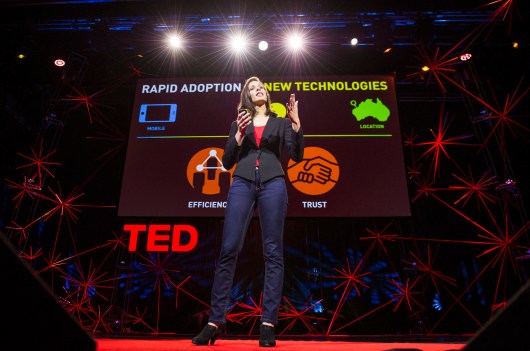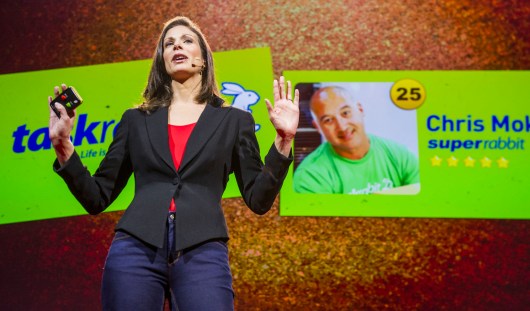What is your reputation?
“If someone asked you for the three words that would sum up your reputation, what would you say?” Rachel Botsman asks us. “The answer to this question will become profoundly important in an age where reputation will become your most important asset.”
She introduces us to Sebastian, a host on Airbnb, a site where people can rent out spare rooms in their houses. More than 50 people have come to stay with Sebastian and his cat, Squeak. Squeak is important to this story because Sebastian’s first guest happened to see a mouse, and she said she’d refrain from leaving a bad review on the site if he got a cat. So he did.
Airbnb, says Botsman, is known to many as a place to rent out spare rooms. But it also has all kinds of stranger places: Lovely holiday homes, treehouses, teepees, castles, airplane hangars. The idea of renting your home to a stranger seemed crazy as recently as a few years ago. Now, there is an Airbnb host on almost every street in Paris.
From collaborative consumption to micro-preneurs
Botsman studies the culture of “Collaborative Consumption.” Through sites like Airbnb, people are becoming what she calls “micro-preneurs.” They’re finding ways to create markets out of the latent value in their homes, cars, and more. The real magic, though, isn’t the spaces or money, it’s using the power of technology to build trust between strangers. During the recent riots in London, Sebastian received a flood of e-mails from previous guests, wanting to know if he was okay and needed anything — 13 of them arrived before his mother phoned. This is why she is trying to champion collaborative consumption into a global movement. “At its core,” she says, “it’s about empowerment. Empowering people to make meaningful connections, connections that are enabling us to rediscover a humanness we’ve lost along the way.”
The irony is that it’s taking us back to market behaviors that are inherent in all of us. Sharing cars, bikes, offices, skills, even pets. Botsman believes that all of this is part of a massive value shift, “Instead of consuming to keep up with the Joneses, people are consuming to get to know the Joneses.”
One of her favorite examples is on a site called Taskrabbit, an “eBay for errands.” People outsource tasks and name a price they’re willing to pay, and vetted “rabbits” bid on them. There is a four-stage interview process to “weed out the dodgy rabbits.” (The #1 task? Assembling IKEA furniture.) Now, one of the rabbits, a man named Chris who found the site after losing his job as an art-buyer, earns $5000/month.
The evolution of trust
The amazing thing, says Botsman, is how fast our ability to trust online has evolved. But with her optimism, there is a note of caution about how this will work in practice: “How do we mimic the way trust is built face-to-face online?”
Reputation, she suggests, is the way to handle that problem. Chris, the rabbit, has a rating of 4.99/5, and has reached level 25 — the highest — making him a Super-Rabbit. That translates into new jobs, and higher fees. This isn’t a totally new concept, but now there is a trail of reputation that follows us. Aggregating online reputations across different sites is a massive challenge, and the next step isn’t adding up into one algorithm-derived number: “People’s lives are too complex and nuanced to do that.” Reputation is largely contextual — and finding a way to make that context clear and usable is the next big challenge.
She envisions a real-time stream of who has trusted you and why — think of it as a Facebook for reputation, a system that puts your reputation into a visual pattern of your reputation capital. This sounds scary, yes. “There are some enormous transparency and privacy issues,” she says. “But ultimately if we can collect our reputation history, we can control it more.”
“When we get it right,” says Botsman, “reputation capital creates a massive positive disruption in who has power, influence and trust. Reputation data will make the resume seem like an archaic relic of the past.” She gives the example of StackOverflow, a site for asking tech questions — 5,500 a day. The site owners learned that people were putting their reputation scores at the top of their resumes, and recruiters were using the site to find talent. This is “a priceless window into how someone really behaves and what their peers think of them.”
In the 20th century, says Botsman, the invention of credit transformed commerce and who had power. This revolution in the 21st century will change how we think about wealth, markets, power and personal identity. “I believe we are at the start of a collaborative revolution that will be as significant as the industrial revolution.”
Watch Botsman’s previous TEDTalk: The case for collaborative consumption >>
Photos: James Duncan Davidson


Comments (20)
Pingback: Rabbit Holes and How Much Trouble Can I Get Into? – darlene599
Pingback: App Overhaul: How the Sharing Economy Will Change the Way Americans Do Business | Kung Fu
Pingback: p2p Marketplaces Meet myTQ the Universal Trust Profile - myTQ Blog
Pingback: The Old Credit Story, Told In A New Way | Good Business New York
Pingback: The currency of the new collaborative economy is trust | Collaborative ConsumptionCollaborative Consumption
Pingback: Speaking of Trust…Won’t you share yours?
Pingback: Would you date Fake Grimlock? How even Dinosaurs can thrive in the Sharing Economy | Miles To Go.
Pingback: Vertrauen in der Sharing Economy
Pingback: Trusting in strangers: Rachel Botsman at TEDGlobal2012 ‹ Stephen J Gaines
Pingback: Vertrauen in der Sharing Economy
Pingback: On the path of reinvention | MovingoutGranni
Pingback: The New Dream Blog
Pingback: Rachel Botsman’s Reputation Revolution: Trust Trumps All « Reputation Issues
Pingback: The glass is half empty and half full: TEDGlobal 2012 Day 3 recap | Indoor Digital Billboards
Pingback: Le verre à moitié plein et à moitié vide : compte-rendu de la 3ème journée de la conférence TEDGlobal 2012 | TEDGlobal Edimbourg 2012
Pingback: Exploring the Citizenscape « Carl's Notepad
Pingback: How to launch two days early, what it was like to work at Napster and more | 21times
Pingback: Must See: Talk über Trends | Social Media Club
Pingback: The glass is half empty and half full: TEDGlobal 2012 Day 3 recap | Krantenkoppen Tech